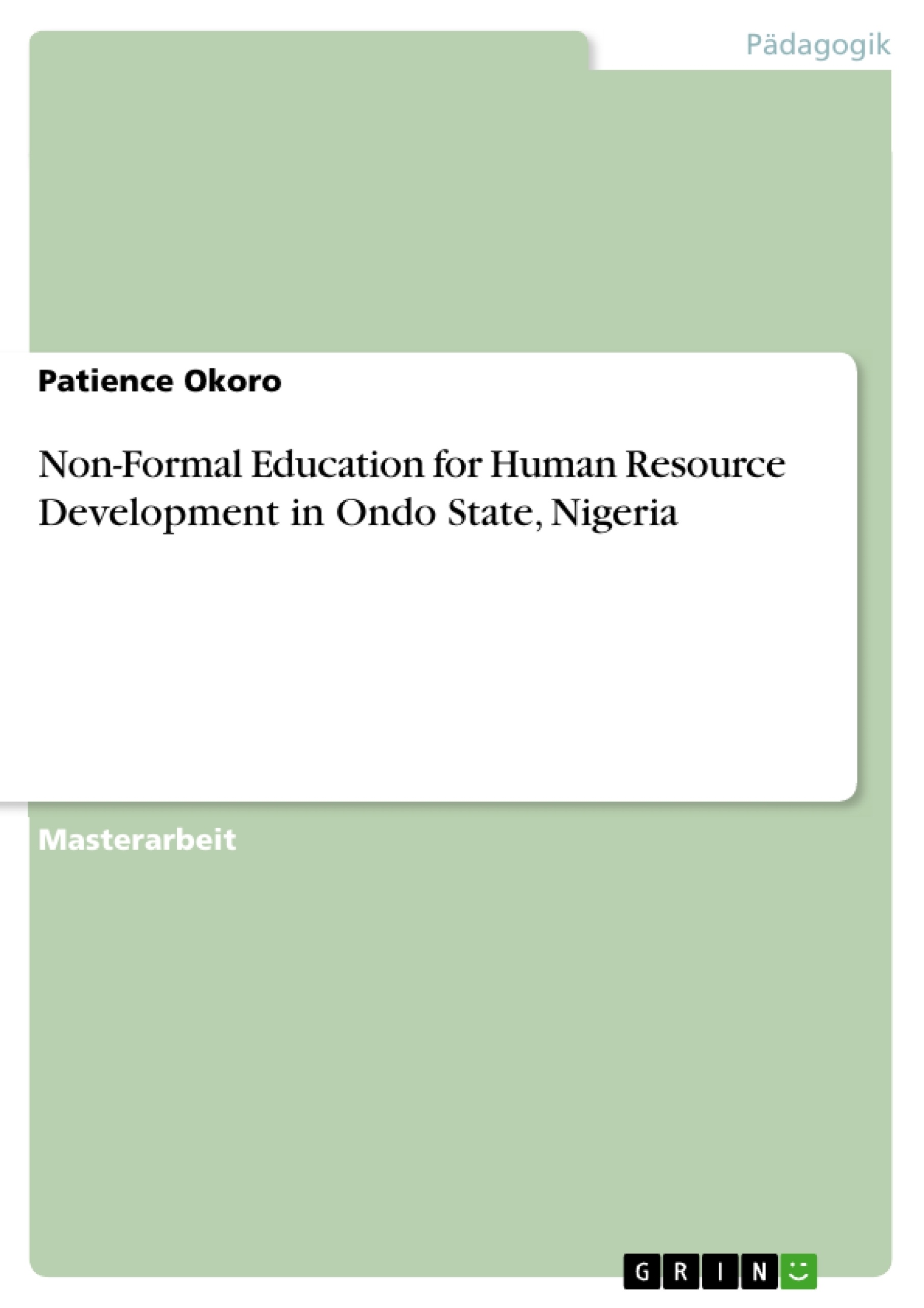This study investigated the contributions of non-formal education to human resource development in Ondo State of Nigeria. It was guided by five research questions and five hypotheses to obtain information on the extent to which non-formal education provided life skills and employment opportunities to the graduates of these programmes. Related literature was reviewed to support this study.
The study measures three group dimensions to determine the contributions of non-formal education in relation to; life planning educational skills, the provision of practical skills to enhance development, the re-skillng and up-skilling of students for increased productivity and development, the acquisition of practical skills for securing employment, and the reduction of poverty.
The study was a survey research. The population was 12,938 students undergoing training in the non- formal educational centres in Ondo state out of which 1,954 were sampled for the study. Questionnaire was used for data gathering and the split-half method was used for computing the reliability coefficient using Pearson Product Moment Correlation.
Inhaltsverzeichnis
- CHAPTER ONE: INTRODUCTION
- Background to the Study
- Statement of the Problem
- Research Questions
- Hypotheses
- Purpose of the Study
- Significance of the Study
- Scope and Delimitation
- Definition of Terms
- CHAPTER TWO: REVIEW OF RELATED LITERATURE
- Theoretical Framework
- Concept of Non-formal Education
- Meaning
- Goals
- History
- Models
- Education and Human Resource Development
- Non-formal Education and life planning skills
- Non-formal Education and practical Skills
- Non-formal Education and re-skilling/upskilling
- Non-formal Education and Employment
- Non-formal Education and Poverty reduction
- Appraisal of Reviewed Literature
- CHAPTER THREE: RESEARCH METHOD AND PROCEDURE
- Research Design
- Population of the Study
- Sample and Sampling Techniques
- Research Instrument
- Validity of the Instrument
- Reliability of the Instrument
- Administration of the Instrument
- Method of Data Analysis
- CHAPTER FOUR: PRESENTATION OF RESULTS AND DISCUSSION
- Presentation of Results
- Research Question 1 and Hypotheses 1
- Research Question2 and Hypotheses 2
- Research Question 3 and Hypotheses 3
- Research Question 4 and Hypotheses 4
- Research Question 5 and Hypotheses 5
- Discussion of Results
Zielsetzung und Themenschwerpunkte
Diese Dissertation untersucht die Rolle der nicht-formalen Bildung für die Entwicklung der Humanressourcen im Bundesstaat Ondo, Nigeria. Sie zielt darauf ab, das Potenzial der nicht-formalen Bildung zur Verbesserung der Fähigkeiten und Kompetenzen der Arbeitskräfte in der Region zu erforschen und zu bewerten.
- Die Bedeutung von nicht-formaler Bildung für die Entwicklung der Humanressourcen in Nigeria.
- Die Rolle der nicht-formalen Bildung bei der Entwicklung von Lebens- und Praxiskompetenzen.
- Die Beziehung zwischen nicht-formaler Bildung und Beschäftigungsmöglichkeiten.
- Die Rolle der nicht-formalen Bildung bei der Armutsbekämpfung.
- Die Herausforderungen und Chancen für die Implementierung und Weiterentwicklung der nicht-formalen Bildung in Ondo State.
Zusammenfassung der Kapitel
Kapitel 1 bietet eine Einführung in die Thematik und die Forschungsfrage. Es beleuchtet den Hintergrund der Studie, die Problematik, die Forschungsfragen, die Hypothese, den Zweck, die Bedeutung, den Umfang und die Definition wichtiger Begriffe.
Kapitel 2 beschäftigt sich mit der Literaturrecherche und der theoretischen Grundlage. Es werden verschiedene Konzepte der nicht-formalen Bildung erörtert, ihre Geschichte, verschiedene Modelle und ihre Verbindung zur Entwicklung der Humanressourcen.
Kapitel 3 beschreibt die angewandte Forschungsmethode und das Vorgehen. Es werden das Forschungsdesign, die Stichprobe, die Datenerhebungsinstrumente, die Validität und Reliabilität der Instrumente sowie die Methode der Datenanalyse detailliert erläutert.
Kapitel 4 präsentiert und diskutiert die Ergebnisse der Untersuchung.
Schlüsselwörter
Nicht-formale Bildung, Humanressourcenentwicklung, Fähigkeitenentwicklung, Kompetenzen, Beschäftigung, Armutsbekämpfung, Nigeria, Ondo State.
Häufig gestellte Fragen
Was ist nicht-formale Bildung?
Bildungsprozesse, die außerhalb des formalen Schul- und Hochschulsystems stattfinden, wie etwa Berufsbildungszentren oder lebenslanges Lernen in Gemeinschaften.
Wie trägt nicht-formale Bildung zur Humanressourcenentwicklung in Nigeria bei?
Sie vermittelt praktische Fähigkeiten und Fachwissen, die direkt die Produktivität steigern und die Beschäftigungsfähigkeit der Absolventen in Regionen wie Ondo State verbessern.
Kann Bildung die Armut in Ondo State reduzieren?
Ja, durch den Erwerb von Lebens- und Praxiskompetenzen erhalten Menschen die Möglichkeit, sich selbstständig zu machen oder eine Anstellung zu finden, was direkt zur Armutsminderung führt.
Was versteht man unter "Re-skilling" und "Up-skilling"?
Re-skilling ist das Erlernen neuer Fähigkeiten für einen anderen Beruf, während Up-skilling die Vertiefung bestehender Kompetenzen zur Produktivitätssteigerung bedeutet.
Welche Rolle spielen Lebensplanungskompetenzen?
Sie helfen Absolventen, ihre berufliche Laufbahn besser zu planen, finanzielle Ressourcen zu verwalten und eigenverantwortliche Entscheidungen für ihre Zukunft zu treffen.
- Citation du texte
- Patience Okoro (Auteur), 2017, Non-Formal Education for Human Resource Development in Ondo State, Nigeria, Munich, GRIN Verlag, https://www.grin.com/document/1330902



